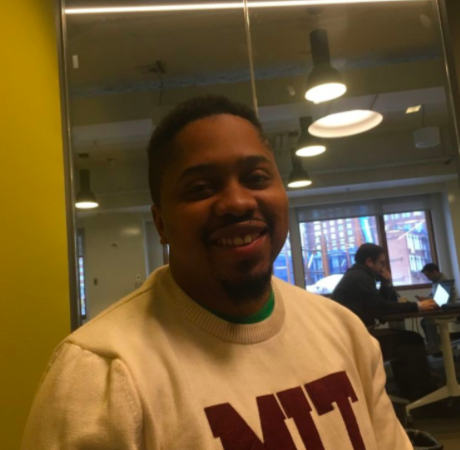Author: Martin Trust Center
Khalid David chats to MIT’s Storyteller In Residence, Dom Smith about his construction start-up, TracFlo, as well as what inspires him and his goals for 2018.

What do you do here at MIT?
My name is Khalid David, and I’m working on a start-up called TracFlo. What we do is change order management for construction companies. So, imagine that you have a leaky sink, and you call a plumber to fix it. He says that it’s going to be 200 bucks, and when he gets there he finds out that it’s not just the sink, it’s the wall and the pipes – all of a sudden it’s going to be 500 bucks!
Construction companies go through the same types of challenges when they are doing work. What we do is we help them track, and manage that change in cost. That’s what change order management is.
Where did the idea come from?
I was working on a major construction firm, and we were working on a side project to help them manage their own internal change order problem. I did that for about three years, Eventually, we realized that the sub-contractors needed the most help, because they didn’t have the resources that these larger firms did to produce these software solutions. So, when I got to MIT, I decided that I was going to focus on the sub-contractors, and help them to manage their changeovers.
Have you always had that entrepreneurial spark?
I like to believe that I did! I grew up in a family of carpenters. My dad was one, so I had been around that industry my entire life. When I graduated, I did so in the recession in 2010, and there weren’t many jobs in construction. I ended up partnering with my dad in the construction field. I was running a drywall company, and that was my first real entrepreneurial experience! I ran it out of my basement, and I learned a lot. I didn’t make a fortune, but learned a lot about what it takes to build a business and the types of challenges that you face. While I was running that, I was trying to solve my own business problems, and that’s when I got interested in construction software. I decided to take a day job so that I could learn to code on the side. I went to my construction company, and they were working on solving the same problems that I was. Because I had that interest, and already had explored it, I easily jumped into their team.
What would you say the biggest challenges have been?
For me personally, the biggest challenge is being willing to take that risk. Every sale is about interaction; you have to constantly be comfortable to put yourself out there, and put your product out there, as well as dealing with rejection and people who don’t like your idea. You have to focus on those wins. To have that mentality that I’m always going to put myself out there – it becomes a daily thing that you need to get used to.
How important do you think mistakes are in the entrepreneurial process?
I think that you have to make mistakes! I think the notion that you don’t make mistakes will create unrealistic expectations. I think you have to be quite naïve to think that you don’t make mistakes. Good entrepreneurs embrace their mistakes, adjust quickly to their mistakes and are willing to push the envelope; they anticipate that there’s more mistakes to come. A mistake could just be launching a product that’s not 100 per cent there. In your mistakes you learn what’s important.
Coming from my own experience, I started my sub-contracting business with my family, I was in my dad’s basement; I didn’t have resources or advisors. I knew that I wanted to do this thing. But, I would say that you have to just do it – if you wait until you’re 40, you are still going to go through the same problems, so do it at 20, do it at 30! It’s all the same learning curve. You can’t skip it. Don’t think if you work a little more, or save a little more you can skip that learning curve of finding the right customer. You’re going to just end up spending the money that you have on finding the wrong one. One piece of advice I give, is do it, and do it now!
I remember taking this class at the Small Business Association on Construction Financing, because I had a degree in Civil Engineering but I didn’t know about flow capital. I was in there with tradesmen who’d worked a trade for years, and they’re now 50, and starting a business! Just because I had a degree didn’t mean that I knew everything! Just being willing to improve your skills is really important to navigate the process.
What do you want to achieve in the future?
I want to know that I’ve built a business worth over a billion dollars! For me personally, I have a family, I’m married and I just had a child. I want to be a whole leader. Working with my co-founding team, I don’t just want to be good at business, I want to be a good person. I want my co-founders to feel like I’m someone they can trust. To me success in business is to have a whole life and I don’t think that they are mutually exclusive!


Follow